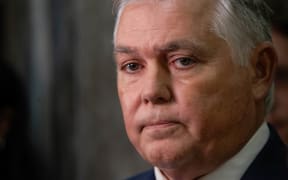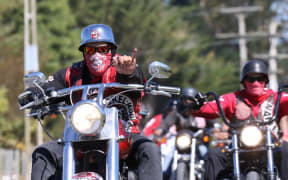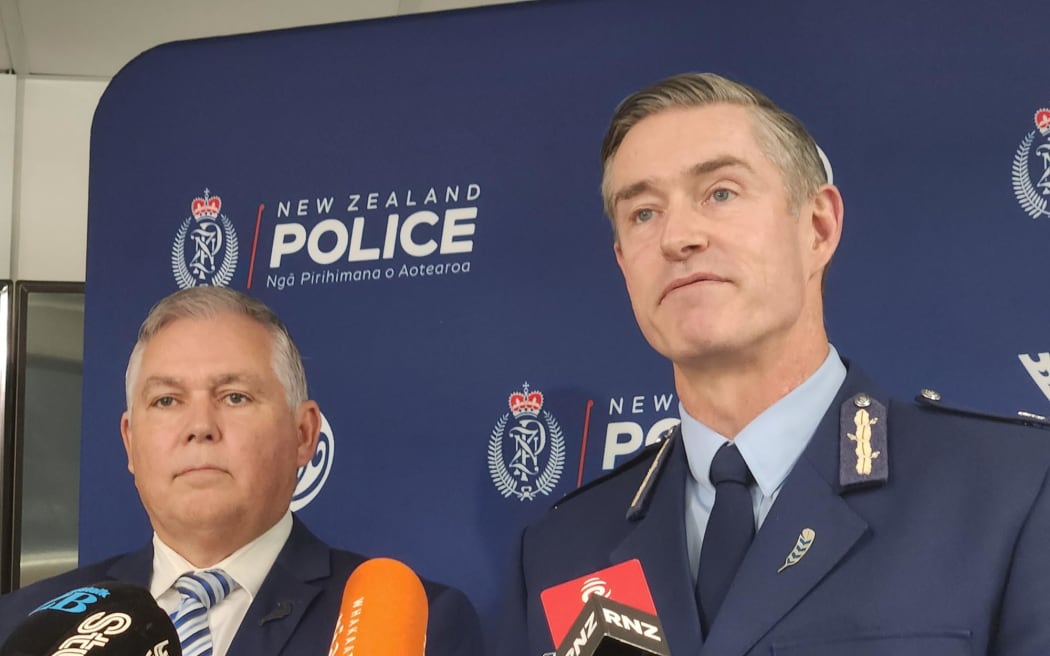
Police Commissioner Andrew Coster with Police Minister Mark Mitchell announcing the police's new national gang unit. Photo: RNZ / Finn Blackwell
Te Pāti Māori says the national gang unit announced today will disproportionately affect Māori and Pasifika, while Labour has called it a 'rebrand' of what it had already set up.
Police Commissioner Andrew Coster announced that the national team would work with police districts across the country, drawing on joint operations to monitor gang funerals and other activity. Resourcing was likely to include a mix of new investment and other resources being moved around, he said.
Coster said he imagined 25 to 30 people would staff the new national unit, while the smaller district teams would be about seven officers. The new units would allow police to be "more focused" with "new tools", such as the gang patch ban due to come into force, Coster said.
Crackdown will disproportionately affect Māori and Pasifika
Te Pāti Māori said the government was creating a boogeyman in order to appear tough on crime.
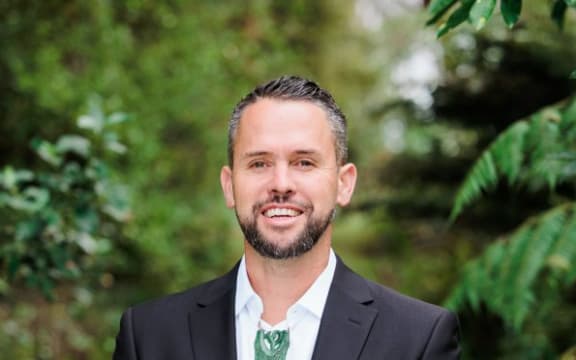
Te Pāti Māori police spokesperson Tākuta Ferris (file picture) Photo: Supplied/ Te Pāti Māori
Its police spokesperson Tākuta Ferris said the unit would not reduce crime, and would put more pressure on police resources and on communities.
"Being tough on gangs is just addressing the system, but they've got to be honest about the root cause of gangs. It's well-known that gangs are a product of the state from the 70s and 80s," Ferris said.
"And until a government owns up to that responsibility and starts investing back into those communities, and raising those communities up out of the impoverished states that they live in, giving people hope and aspiration, you're never going to fix the problem. You're actually going to exacerbate the problem."
Ferris said the crackdown would disproportionately affect Māori and Pasifika, and perpetuate a never-ending cycle.
"It could come down to a police officer's discretion that he thinks you're a gang member. In all of those scenarios, particularly where the police have the authority to use their discretion with things like warrantless searches and detaining people on the basis they think 'a, b, and c', these thinks don't pan out well for Māori."
Green Party police spokesperson Tamatha Paul said if having more police meant fewer gang members, then there would not be any gangs in Aotearoa.
She said if the government did not want gangs in New Zealand, it could make that happen, but only by addressing the drivers.
"Our questions have to be why do we have gangs in the first place? Why do they feel they need to intimidate the public? What's driving people into joining gangs in the first place? And then we can understand what those solutions look like," she said.
"But I can guarantee you that increasing the hostility between police and gangs within communities is not going to make them any safer. It's going to make them worse."
Police Minister Mark Mitchell told Checkpoint a lot of the family violence incidents which police dealt with came out of the gang culture.
"It's an intergenerational problem and we have to tackle that from two sides," Mitchell said.
"One is social investment; get into people's lives much earlier, investing in them and trying to keep out of the criminal justice system and allow them to actually reach their potential and take advantage of all the opportunities that our country offers and the other part of it, of course, is the actual response side of it."
The moves would also free up police from responding to mental health call-outs, he said.
'A rebrand'
Labour police spokesperson Ginny Anderson said the national gang unit was simply a rebrand of what her party had already set up.
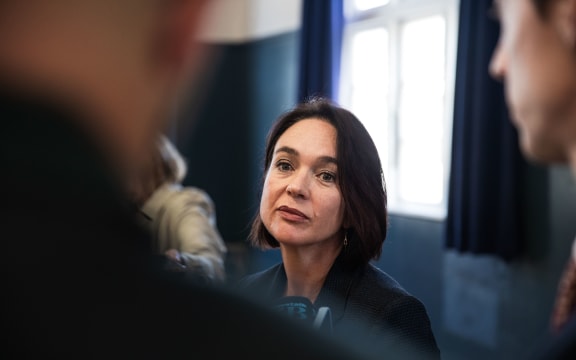
Ginny Anderson Photo: RNZ / Samuel Rillstone
"From my understanding, Operation Cobalt and Operation Tauwhiro were standing operations and what this announcement today is embedding those operations into district levels. I support that but it's nothing new.
"This is a rebrand of existing mechanisms in place to crack down on organised crime and, with police pay negotiations still unresolved with nearly seven months in government, they're asking police to do more but they won't pay them."
Officers executing search warrants to seize gang patches was not a good use of police's time, Anderson said.
"It's important that New Zealand communities feel safe but it's also important that we have a government that tackles the causes of crime and methamphetamine causes more damage in New Zealand than gang patches."
Mitchell denied this was a political rebrand of the existing police organised crime group unit.
He expected to see about 20,000 less victims of serious violent offending by 2030 as a result of the new unit. But he could not say exactly how much he wanted gang memberships to drop by.
"We want to apply as much pressure to them that we see people that we see gang members, especially those with children and families, wanting to leave the gangs because it's going to become too miserable to be part of a gang and continue to try and peddle their criminal activities and the drugs and violence and everything else that they're associated with."
"My expectation for the gang disruption units is that they disrupt the gangs, that they seize assets, that they arrest gang members, that they end up in prison instead of out in the community causing harm."
Units to be 'more focused' with 'new tools' - Police Commissioner
Police Commissioner Andrew Coster said while police were already doing what the minister had stated in his media release - "identify, target and catch priority gang offenders" - these new units would allow them to be "more focused" with "new tools", such as the gang patch ban due to come into force.
"They will have a specialist knowledge of what's going on in gangs in their environment and they will be freed up to focus substantially on that. So this is really about where we are focusing our effort and building up a capability to do a very consistent and coordinated implementation of new legislation."
All officers would have such tools available to them but Coster said the units would mean they were coordinated in their approach.
"We do rely on having knowledge of what gangs are up to and so having a unit focus to that purpose of gives us better chance of building up the knowledge that we need about what's happening locally."
Some staff would be reprioritised to these units, but he would not go into the details of which staff would be affected.
"We obviously have various units that are undertaking duties that are complementary to this. So that's one area where we would be having some discussion and of course we are awaiting budget announcements, at which point we may speak in more detail to that as well."
Mental health call-outs was an area where police had become thinly spread, he said.
"We need to be able to focus on the things that are most closely aligned with police's legislative responsibilities.
"Our role is mandated by statute and what we are talking about is coming back more closely to our statutory role. There are others who have got responsibilities that are set in that area and of course we're engaging about what that kind of transition looks like."
Unit 'in line with public mood'
Canterbury University sociologist Dr Jarrod Gilbert, who wrote the book Patched: The History of Gangs in New Zealand, said the unit focused on an area of political and public worry.
"We've seen the political winds change substantially, and frankly, I think that's in line with public mood," he said.
"And that is that the overt, anti-social activities of gangs have become unacceptable, and this is the police directly responding to that."
Good intel would allow police to put resources where they were needed, he said.
"If you have good intel around gang activities that are coming up, and then police can put resources into ensuring that those are controlled in ways the public would expect, then hopefully you'll see less public concern around these issues," Gilbert said.
"You know, that's got to be a win.
"It's just going 'right, those overt displays of violence and disorder, that's an issue, let's put some resource into it and see if we can't dampen it down'."
Putting more dedicated staff in the regions to focus on gang offending as a priority, and more co-ordination around things like intel, should assist police, Gilbert said.
"How this plays out when the proposed new laws come in is a different story all together," he said.
"The numbers that are announced now will be insufficient to tackle that themselves, and that's going to require a broader police response."

